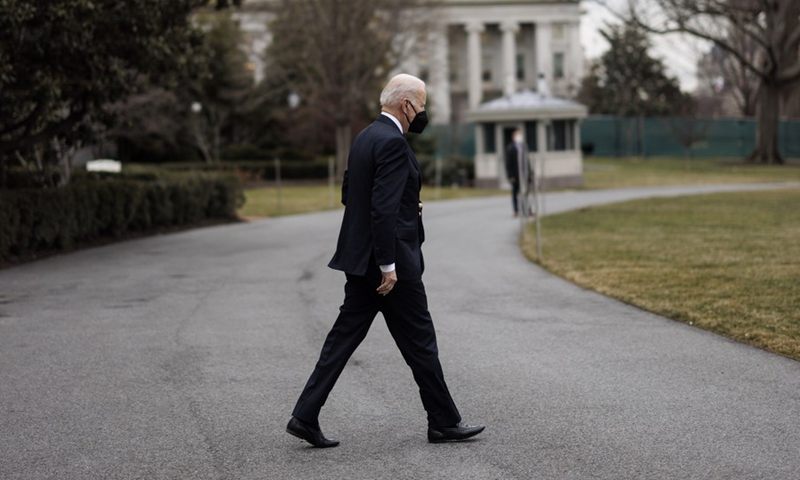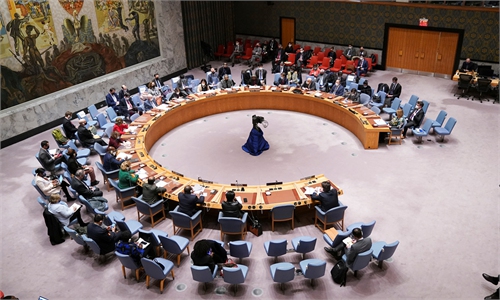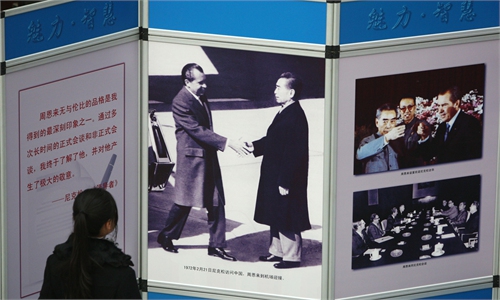
U.S. President Joe Biden walks out from the South Portico of the White House in Washington, D.C. Jan. 21, 202(Photo: Xinhua)
World leaders "scrambled" to condemn Russia and to signal possible sanctions. This is how Time magazine and a series of Western media outlets reported since Tuesday, creating a wave of denunciation and measures against Russia for its latest move in the Ukraine crisis. But the reports are more of a publicity stunt than serious voices, more bark than bite. The mainstream attitude of the international community is to view the issue from a historical perspective.
The historical perspective is that the US-led NATO's eastward expansion has been marching on without respecting Russia's legitimate security interests, and NATO violated agreements signed with Russia over the bloc's expansion. Against this backdrop, neither the US nor NATO members are qualified to condemn or sanction Russia in the name of justice.
And it is clear that aggressive US-led gestures toward Russia are more a political show to Western domestic audiences. They do little to actually resolve the Ukraine crisis. To some extent, the gestures pushed the Ukraine crisis to where it is today.
The truth is, apart from the US, what most countries around the globe care about is the maintaining of security and stability within the international community, but not in the Cold War mentality of pursuing a certain party's safety via the sacrifice of others' security interests.
We might witness seemingly overwhelming voices from Western countries, and certain nations, like the UK, are following the US relatively closely. But other countries' attitudes tell a different story.
Germany has halted the process of certifying the Nord Stream 2 pipeline but Berlin knows that the price of Russia's natural gas is relatively low. If it purchases natural gas from the US, it may have to pay much more. In this regard, if Europe imposes sanctions on Russia, Europe itself will suffer in the end.
Moreover, India's response has startled the West. India has been cautious in raising voices over the latest Ukraine situation. It has tried to be neutral, attempting to avoid meddling in the mud. Derek J. Grossman, a research fellow at RAND, showed how shocked he was on Twitter, "India's decision not to condemn Russian aggression vs Ukraine is absolutely deafening. India is the only Quad participant condoning Russian misbehavior. Really bad look."
That's the point. India is a member of Quad, but it does not readily follow the US. It knows that attaching itself tightly to the US does not serve its national interests. A large portion of India's weapons are purchased from Russia. If India offends Russia, will it still be able to continue its arms deals? If not, will the US be trustworthy enough to fill the gap? When it comes to economy and trade, India's ties with China can hardly be replaced by the US.
Regarding Russia's actions in Ukraine, the posture of US-led Western countries seems aggressive, but the sanctions against Russia are much milder than expected.
So far, the US has imposed sanctions on two major Russian banks and on the country's sovereign debt as well as some individuals. The package is not unusual and is far from a destructive blow to Russia's entire financial system.
The US' weakness has been fully exposed. It once enjoyed Cold War dividends, but today is like a second-generation rich who has dissipated all wealth and resources accumulated by the previous generation. All it can do is fighting a war of words, without the capability to make real actions. When its followers make statements to support the US, they don't really mean it.
Most countries realize that Russia is defending its own territory, trying to stop the intrusion of US-led NATO. The US is the true source of trouble. US hegemony is the root cause of the threat the world is facing today.
The US-led cliques or gangs, such as Quad, their proposals, the way they are formed, and even their existence are contrary to the theme of the world today. India's stance reflects the mentality of other participants in US-led small groups - they would like to join for gains, but when they have to pay huge prices, they would think twice.
Although the situation seems tense, it has come to a halt. If neither Russia nor Ukraine fire the first shot, the status quo will remain. Biden has made it clear that "we'll continue to escalate sanctions if Russia escalates." In other words, if there is no escalation of tensions, all parties involved will return to the negotiating table.
The author is a professor at the School of International Relations and Public Affairs of Fudan University. opinion@globaltimes.com.cn



